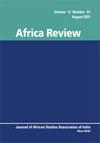身份与遗产:津巴布韦不断变化的政治和遗产的挪用
IF 0.5
Q4 AREA STUDIES
引用次数: 1
摘要
本文解释了在津巴布韦不断变化的政治矩阵中使用遗产表征和叙事。分析是在遗产被视为文化过程而不是产品的背景下进行的。重点是遗产如何被殖民和后殖民国家在建立民族认同的过程中被挪用。从1890年起,移民们侵占了林波波河和赞比西河之间土地上属于土著群体的一些现有遗产。本文充分认识到,身份是一个流动的、有争议的概念,受文化框架、历史时期和任何特定时期的掌权者的影响。因此,遗产在这里被视为身份影响者,在新兴国家的情况下;遗产负责国家认同的建构。本文章由计算机程序翻译,如有差异,请以英文原文为准。
Identity and heritage: changing politics and appropriation of heritage in Zimbabwe
ABSTRACT This article is an explanation of the use of heritage representations and narratives within the ever-changing political matrix in Zimbabwe. The analysis is done within the context of heritage being regarded as a cultural process rather than as a product. Focus is on how heritage has been appropriated by both the colonial and post-colonial state in building national identities. From 1890 the settlers appropriated some of the existing heritage that belonged to indigenous groups on the land between Limpopo and Zambezi Rivers. The article fully acknowledges that identity is a fluid and controversial concept that is influenced by cultural frameworks, historical period and those in power at any particular time. Therefore, heritage herein is viewed as an identity influencer and, in the case of emerging nations; heritage is responsible for the construction of national identity.
求助全文
通过发布文献求助,成功后即可免费获取论文全文。
去求助
来源期刊

Africa Review
AREA STUDIES-
CiteScore
1.80
自引率
12.50%
发文量
22
期刊介绍:
Africa Review is an interdisciplinary academic journal of the African Studies Association of India (ASA India) and focuses on theoretical, historical, literary and developmental enquiries related to African affairs. The central aim of the journal is to promote a scholarly understanding of developments and change in Africa, publishing both original scholarship on developments in individual countries as well as comparative analyses examining the wider region. The journal serves the full spectrum of social science disciplinary communities, including anthropology, archaeology, history, law, sociology, demography, development studies, economics, education, gender studies, industrial relations, literature, politics and urban studies.
 求助内容:
求助内容: 应助结果提醒方式:
应助结果提醒方式:


